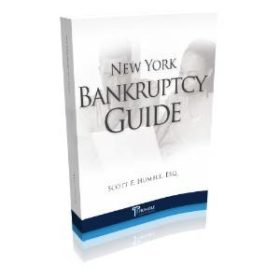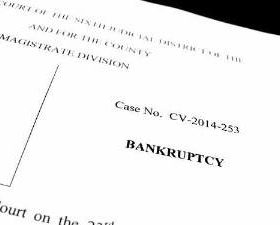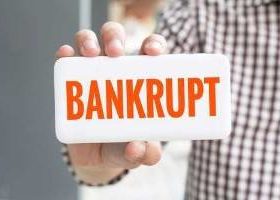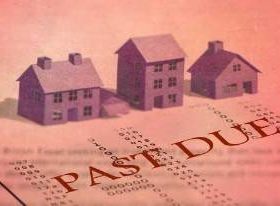Filing for bankruptcy can feel like the end of your financial life, but it’s really the beginning. The New York Bankruptcy Guide was created by Jamestown bankruptcy attorney Scott Humble to show residents how to become free of debt without sacrificing their personal belongings.
 In the modern world, where financial responsibilities can reign supreme, it is not always possible for everyone to make ends meet. Following the loss of a job, a divorce, medical emergencies, or hard times in general, New Yorkers far and wide can struggle to pay off each and every bill in full. When debts start to rise faster than one’s income does, the options that are available to help a person remain solvent become fewer and fewer. Ultimately, once all other resources run dry, there is only one option left: declaring bankruptcy.
In the modern world, where financial responsibilities can reign supreme, it is not always possible for everyone to make ends meet. Following the loss of a job, a divorce, medical emergencies, or hard times in general, New Yorkers far and wide can struggle to pay off each and every bill in full. When debts start to rise faster than one’s income does, the options that are available to help a person remain solvent become fewer and fewer. Ultimately, once all other resources run dry, there is only one option left: declaring bankruptcy.
Download Our FREE Bankruptcy Guide
Chapter 7 Bankruptcy
Bankruptcy should be used as a last resort. Though it has major benefits, bankruptcy also carries with it several significant drawbacks, and the consequences of declaring bankruptcy can linger for years, if not for the rest of a person’s life. If you meet specific criteria, you may qualify for a Chapter 7 bankruptcy, which is the most common form of bankruptcy. Filing for Chapter 7 bankruptcy means you intend to sell many of your assets in order to pay off as many of your eligible debts as possible, but you will still be responsible for maintaining regular payments to certain accounts and individuals. Speaking with an experienced Jamestown bankruptcy attorney is the most efficient way to navigate the bankruptcy process, and if you still have any questions after reading the following, consider contacting our New York law office for further guidance.
Why Is Chapter 7 Bankruptcy Right for Me?
 There are six kinds of bankruptcy under US federal law, all of which are named after the chapter of Title 11 of the United States Code: Chapter 7, Chapter 9, Chapter 11, Chapter 12, Chapter 13, and Chapter 15. Of these, it is predominantly under Chapter 7 and Chapter 13 that private citizens rather than businesses file their bankruptcy claims.
There are six kinds of bankruptcy under US federal law, all of which are named after the chapter of Title 11 of the United States Code: Chapter 7, Chapter 9, Chapter 11, Chapter 12, Chapter 13, and Chapter 15. Of these, it is predominantly under Chapter 7 and Chapter 13 that private citizens rather than businesses file their bankruptcy claims.
While Chapter 13 is reserved for setting up a repayment plan for bankrupt people to repay their creditors over time, Chapter 7 helps people to eliminate many of their debts, absolving them of any further responsibility to pay off these lingering debts. Essentially, a Chapter 7 bankruptcy informs creditors that an individual simply does not have and will not have the money to pay off all given loans, and most lenders will be legally mandated to cancel that person’s debts.
Some regular expenses and debts will remain, and these can include student loans, alimony, and fines. Home mortgages and car loans are likely to be exempt from bankruptcy as well, and if you have elected to file for a Chapter 7 bankruptcy, you will be required to continue making regular payments or risk the bank repossessing your home and car. Before you file for Chapter 7 bankruptcy, you will need to speak with a bankruptcy attorney in order to better prepare for the debts that your declaration of bankruptcy will not erase. Without a home or motor vehicle, it will be significantly more difficult to continue paying off the debts that persist following a filing.
How Can I File for Chapter 7 Bankruptcy in New York State?
 It is possible to file for Chapter 7 bankruptcy in New York, regardless of city or town, as long as an individual’s average monthly income has been below the median income in New York State. Those who consider filing for bankruptcy must calculate their average monthly income over the previous six months and then refer to New York’s list of criteria in order to check eligibility. An individual will be able to file as long as her or his average monthly income is below the median income for a household of comparable size. For example, a single person with no partner or children must have an average monthly income below $4,335 (an annual income of $52,024) in order to be eligible for Chapter 7 bankruptcy. A married individual or a parent with one child must instead have an income below $5,556 (an annual income of $66,667), as that person’s household would comprise two people. An individual in a three-person household, such as a person with two children or with a spouse and one child, needs a monthly income below $6,596 (an annual income of $79,154) in order to qualify, and so on.
It is possible to file for Chapter 7 bankruptcy in New York, regardless of city or town, as long as an individual’s average monthly income has been below the median income in New York State. Those who consider filing for bankruptcy must calculate their average monthly income over the previous six months and then refer to New York’s list of criteria in order to check eligibility. An individual will be able to file as long as her or his average monthly income is below the median income for a household of comparable size. For example, a single person with no partner or children must have an average monthly income below $4,335 (an annual income of $52,024) in order to be eligible for Chapter 7 bankruptcy. A married individual or a parent with one child must instead have an income below $5,556 (an annual income of $66,667), as that person’s household would comprise two people. An individual in a three-person household, such as a person with two children or with a spouse and one child, needs a monthly income below $6,596 (an annual income of $79,154) in order to qualify, and so on.
To file for Chapter 7 bankruptcy, an individual must submit a filing in a district court. The court where a filing can be submitted depends, however, on more than just where a person currently lives. Residents of the five boroughs of New York City, for example, can file in the nearest Eastern District (Brooklyn, Queens, and Staten Island only) or Southern District (Bronx and Manhattan only) bankruptcy court, but the filers would have to have lived at their present addresses for at least 91 of the previous 180 days. If they had moved within the three months before filing for bankruptcy, they may be required instead to file in courts near their previous addresses. To determine whether you can file for Chapter 7 bankruptcy in your current district, you should contact a local Jamestown bankruptcy attorney for further information.
How Does the Filing Process Work?
Because bankruptcy is such a major undertaking for every person and entity involved, those who opt to file for Chapter 7 bankruptcy must demonstrate absolute need. As such, if you wish to file, you will be required to provide a profusion of financial documents including but not limited to a list of your current expenses and income, a copy of your most recent tax return, a record of all your pending student loans and the accrued interest, and a certificate showing completion of a credit counseling course. This may sound like a great deal of work, but it is merely the first step in a journey lasting several months before you will be able to complete your Chapter 7 bankruptcy filing.
Our law office of Jamestown bankruptcy lawyers has years of experience in guiding clients throughout New York along the process of filing for Chapter 7 bankruptcy. If you have any additional questions about how to qualify and file for Chapter 7 bankruptcy, contact our team of bankruptcy attorneys today for a consultation.
Chapter 13 Bankruptcy
 Sometimes in life, things just do not work out. Despite our hard work, persistent effort, and flexibility, problems can appear and set us back significantly. We can save money for years, trying to build up a rainy day fund and pay off our debts, only to see a sudden emergency drain that fund dry while debts continue to mount. There are always options available for those of us who have fallen on hard times, from bank loans to credit cards to refinancing. When all else falls through, however, declaring bankruptcy can be our final fail-safe.
Sometimes in life, things just do not work out. Despite our hard work, persistent effort, and flexibility, problems can appear and set us back significantly. We can save money for years, trying to build up a rainy day fund and pay off our debts, only to see a sudden emergency drain that fund dry while debts continue to mount. There are always options available for those of us who have fallen on hard times, from bank loans to credit cards to refinancing. When all else falls through, however, declaring bankruptcy can be our final fail-safe.
There is a social stigma to declaring bankruptcy; many people view it as an admission of defeat or even irresponsibility. Indeed, from a legal and financial standpoint, declaring bankruptcy carries with it numerous consequences that can and will last for several years. Nevertheless, when we either simply cannot pay all of our bills or need a little more time to pay them all in full, declaring bankruptcy is the primary way to hit the reset button. Although those who declare bankruptcy have to contend with the economic repercussions, they will still be able to make as fresh a start a possibility.
Because bankruptcy essentially entails convincing numerous companies and organizations that many of your debts deserve extra time or even forgiveness, declaring bankruptcy is designed to be an intricate process. If you decide to declare bankruptcy in the state of New York, you will have to provide countless documentation, your every financial move will be scrutinized, and you may have to invest months or even years before your declaration is acknowledged. For guidance through the process of declaring bankruptcy in New York, consider contacting our office of Jamestown bankruptcy attorneys today.
Types of Bankruptcy Available in New York State
Title 11 of the United States Code recognizes six distinct types of bankruptcy, each of which takes its name from a chapter of the Code. While Chapter 9 is reserved for municipalities, Chapter 11 is used by businesses, the little-used Chapter 12 tends to benefit fishermen and farmers, and Chapter 15 concerns foreign debts to the US, individuals can take advantage of Chapters 7 and Chapter 13 bankruptcy in order to have their debts forgiven or restructured. Combined, Chapter 7 and Chapter 13 bankruptcy constitute hundreds of thousands of filings each year in the United States, with Chapter 7 far more common of the two filings.
Filing for Chapter 13 Bankruptcy vs Filing for Chapter 7 Bankruptcy
The primary difference between Chapter 7 and Chapter 13 bankruptcy lies in their goals. Chapter 7 bankruptcy involves selling a filer’s assets in order to repay certain debts, while Chapter 13 bankruptcy allows filers to reorganize their financial matters while determining a more manageable plan for repayment. Those who file for Chapter 13 are also able to keep their assets and property under most circumstances; filing for Chapter 7 often entails surrendering assets to the court through the process of liquidation.
There are also other factors that can persuade a person to choose Chapter 13 over Chapter 7. Unlike Chapter 7, which has a proportionate maximum income limit for filers, Chapter 13 is available to those from a wider range of income brackets. Chapter 13 can aid in preventing or delaying a car repossession or home foreclosure, and this form of bankruptcy is better designed for those who already have a steady income. While Chapter 7 bankruptcy tends to impact individuals’ credit scores for a full decade after filing is complete, Chapter 13’s effects last instead for seven years, and that three-year gap can make a lifetime of difference.
Downsides to Filing for Chapter 13 Bankruptcy
 Filing Chapter 13 bankruptcy has a few immediate drawbacks. In contrast to filing for Chapter 7 bankruptcy, a process that can last for months at a time, filing for Chapter 13 bankruptcy will take three to five years to complete. In addition, people who have been approved for Chapter 13 bankruptcy have less free rein; they must live according to an almost ironclad budget, one that their bankruptcy court trustees will vigilantly oversee. Though individuals who file for Chapter 13 are typically allowed to retain most of their assets, the constant financial surveillance and rigidity may pose a significant emotional strain over time.
Filing Chapter 13 bankruptcy has a few immediate drawbacks. In contrast to filing for Chapter 7 bankruptcy, a process that can last for months at a time, filing for Chapter 13 bankruptcy will take three to five years to complete. In addition, people who have been approved for Chapter 13 bankruptcy have less free rein; they must live according to an almost ironclad budget, one that their bankruptcy court trustees will vigilantly oversee. Though individuals who file for Chapter 13 are typically allowed to retain most of their assets, the constant financial surveillance and rigidity may pose a significant emotional strain over time.
Filing for Chapter 13 Bankruptcy in the State of New York
While it is possible, albeit rather difficult under almost all circumstances, to file for Chapter 7 bankruptcy without legal counsel, the additional complexity of the Chapter 13 filing process requires the close guidance of a Jamestown bankruptcy attorney. Because Chapter 13 bankruptcy largely entails the gradual repayment of debts and not debt forgiveness, it is critical that filers continue to work and earn income at every step of the filing process and for the duration of the repayment plan to which they, their attorneys, and the bankruptcy court all agree.
Because the state of New York is divided into four jurisdictions, New Yorkers have to file for bankruptcy in the federal district court that manages cases from their city or town of residence. Individuals who live in Long Island, Brooklyn, or Queens are under the jurisdiction of the US District Court for the Eastern District of New York; residents of the Hudson Valley, the Bronx, Manhattan, and Staten Island must file in a Southern District court; those from Western New York or portions of the Finger Lakes and Southern Tier regions have to file in a Western District court; and the remainder of New York State is subject to Northern District courts.
The court in which you need to file for bankruptcy can change from one town to the next, so you should consult a bankruptcy attorney from your current district for guidance throughout the filing process and beyond. Even if you are no longer a New York State resident, you will be mandated to file for bankruptcy in New York if you have not lived at your current address for a minimum of 91 days of the past six months, and the distance can prove a significant inconvenience without an attorney’s help. If you have questions about how to begin the process of filing for Chapter 13 bankruptcy under New York law, contact our office of bankruptcy attorneys today for information, recommendations, and advice.
Download Our FREE Bankruptcy Guide
Frequently Asked Questions | New York Bankruptcy Guide
What Can Bankruptcy Do for Me?
 When clients come in and they’re asking for financial help, they’re in trouble. The bottom line is they’re in financial trouble; there’s a lot of stress. It’s hard to make the phone call. It’s really hard to come in. What they find is once I’ve talked to them and given them all of their options, they feel a lot better. They wanted to know really what it could do for them.
When clients come in and they’re asking for financial help, they’re in trouble. The bottom line is they’re in financial trouble; there’s a lot of stress. It’s hard to make the phone call. It’s really hard to come in. What they find is once I’ve talked to them and given them all of their options, they feel a lot better. They wanted to know really what it could do for them.
Number one, it is going to stop the harassment. It’s going to stop not only the creditors calling you, writing you, texting you, emailing you, but it’s also going to protect all of your assets. You don’t have to worry about losing the house or the car or whatever the case may be. It also is going to stop any civil litigation between you and someone else. It stops all of the litigation. The only exception would be something like family court or divorce. It certainly isn’t going to stop something like that.
It allows you to be protected while you get your situation under control. Now if it is just an unsecured problem; credit cards and medical bills, credit lines, whatever the case may be, then a Chapter 7 is just going to wipe that out. You’ll walk away free and clear of that in four months. Whereas if you’ve got a much more complex situation; you’re behind on your house, you’re behind on your vehicles, you’re behind on your income taxes, you’re behind on your real estate taxes, more complex situations like that, then we’re going to file a Chapter 13.
The whole purpose of the Chapter 13 is to get you under control so that every debt collector can get paid what they’re entitled to under Chapter 13 bankruptcy. Generally speaking, everyone gets paid over a term of up to five years, at the shortest three years. The exceptions of course are your unsecured creditors, including your credit cards, your medical bills, your credit lines; they are going to take a hit. Our goal is to save you from 95% of that debt. You can pay back that 5% over five years.
Will Bankruptcy Ruin My Life?
One thing people worry about when they think about bankruptcy is that it’s the end of their life, whereas actually what they learn throughout the process it’s actually the beginning of a new stage or chapter in their life. The preconceived notion is that they’re going to lose everything. Actually, the only thing that they lose is their debt. For Chapter 7, we wipe out the unsecured debt, and they keep their assets. If they’ve got too much equity in their assets, then we look at a Chapter 13 to save those assets. Other good reasons to file a Chapter 13 would be that you’ve got tax problems. It doesn’t matter if it’s real estate taxes or income taxes, we can resolve those issues, and if you’re behind on a vehicle or it’s even been repossessed, as long as it hasn’t been sold, I can file Chapter 13 and get that vehicle back for people.
Am I Qualified for Bankruptcy?
There really isn’t a technical qualification process for bankruptcy. Anyone can qualify for bankruptcy, but the question becomes pursuant to the changes in bankruptcy law, which took effect on October 17th, 2005. Do you qualify for a Chapter 7 bankruptcy? If you must file a Chapter 13 bankruptcy, are you going to be able to pay the minimum that is allowed? Now, the key here is unsecured creditors, and what people have trouble sometimes getting in their mind and understanding is that that is where your savings is on a Chapter 13. In other words, that’s where you get your savings. You pay a lot less. The minimum in our jurisdiction is five percent for five years, so that’s only one percent a year or a penny on a dollar for each year, so that’s a huge savings. That’s a drop in the bucket compared to what people owe in unsecured debt, so it comes out to a spectacular deal, basically, for anybody that files. One step better is to pay nothing, and that’s what our goal is in Chapter 7. When someone comes in, my kneejerk reaction, is that they want to keep everything, house, car, whatever the case may be, and number two, that they want to file Chapter 7 and not pay any unsecured creditors back and be in and out of the whole process in less than four months.
How Long Does Bankruptcy Stay on Credit Report?
In the past, it was a big deal because it stayed on your credit report for up to ten years. Keep in mind that any of your late payments, judgments, whatever the case, is going to stay on your credit report for seven years, so there’s now a big difference.
When the banks and the credit card people learned in early 2000s that over a million people were filing for bankruptcy a year, and they considered how many of those people were potential customers that they were going to lose over a ten-year period. That’s ten million people, over ten million people that they were going to go and discriminate against and not give credit to for ten years. They’re a little bit greedy so they decided that they weren’t going to discriminate against people like that anymore, and they were going to go and give you credit in the quite near future.
After one year of discharge on a Chapter 7 or a Chapter 13, your credit score is going to go up approximately 100 points. You’re going to be able to go and get credit cards in the near future, in less than a year. I would start off with the easy ones like your gasoline cards, Sears or something like that and then work up to a MasterCard or Visa.
It’s really pretty easy now to get a vehicle loan after you’ve filed a bankruptcy for a couple of different reasons. The timeline for a vehicle loan is about five or six years and you can’t file another Chapter 7 bankruptcy for eight. They know that you’ve got to have a vehicle to go back and forth to work and take care of your family, so they consider that you’re going to have a five-year term of making payments and you can’t follow Chapter 7 for another eight years, so it’s a pretty good risk. Also, you’ve worked out all that unsecured debt so they don’t have to worry about your down payments instead of your vehicle. That’s why they approve those easily.
With mortgages, however, you’re looking at somewhere between two and a half and three years to be considered for a mortgage. After bankruptcy, the future is pretty bright.
How Do I Prepare for Bankruptcy?
 By the time someone has actually spoken to me, they have gone and talked to family, friends, done research on the internet, so when they come in, they’re pretty well prepped about what’s going on. They can’t afford to be sitting here in my office, when they could be making money at their job, so when they come in, I don’t make them wait. I get them right in here. We sit for initial consultation. I try to make it in 30 minutes. We go down through the process of what their situation is, what they can file, and then I give them a list. I give them a folder. It has information in it. It has the breakdown of exactly what the rules are. You and your assets are all protected. It’s a breakdown as far as the fees go, as far as what the filing fee is, what my fee is, and then, on the back, there’s a list of what documentation I need on each case. Each jurisdiction is a little bit different on that, but they all require a certain amount of documentation with, paystubs, income tax returns, and stuff like that.
By the time someone has actually spoken to me, they have gone and talked to family, friends, done research on the internet, so when they come in, they’re pretty well prepped about what’s going on. They can’t afford to be sitting here in my office, when they could be making money at their job, so when they come in, I don’t make them wait. I get them right in here. We sit for initial consultation. I try to make it in 30 minutes. We go down through the process of what their situation is, what they can file, and then I give them a list. I give them a folder. It has information in it. It has the breakdown of exactly what the rules are. You and your assets are all protected. It’s a breakdown as far as the fees go, as far as what the filing fee is, what my fee is, and then, on the back, there’s a list of what documentation I need on each case. Each jurisdiction is a little bit different on that, but they all require a certain amount of documentation with, paystubs, income tax returns, and stuff like that.
How do I protect my assets?
My goal is to protect everything. Chapter 13 is designed to save your house, save your car, and the typical assets. The same is true with Chapter 7. As long as we’ve got enough exemption power to protect those assets, they’ll be protected. Otherwise we’ll file Chapter 13 for you.
I try to work up the exceptions and that would be something that the judge considers luxuries. You file a Chapter 13 and you have a vehicle that is worth too much money that can be a luxury. A motorcycle can be considered a luxury.
In the context of a Chapter 13, what the court is going to have you do is pay the unsecured creditors a little bit higher. Normally we start at 5%; they’re going to want more than 5% if you want to keep a luxury. I have clients consider giving up that luxury so that they can take care of this financial problem.
Chapter 7 is a little bit different. I tell that to every client who walks in the door and we talk about luxuries. Boats, motorcycles and airplanes definitely are luxuries and at any time the US Trustee, the policeman of the system, can step in and say, “Look, you’re spending – let’s say $350 a month plus insurance – on a Harley Davidson motorcycle, whereas you could be paying creditors over $350. That’s a problem; we want you to convert to a Chapter 13.”
I have never seen that happen on any of my cases. I’m extremely particular about your income and expenses as disclosed to the court. You’re hiring me to make it so that your case is going to work.
Will I lose My House or Car in Bankruptcy?
You’re not going to lose your house or car. In a Chapter 7, you’re going to continue making those payments on house or a car. The bank is going to send us what’s called a reaffirmation agreement, and you’re going to sign those and continue to pay. Even if they don’t send you a bill, it’s important to continue to pay to keep those assets.
In a Chapter 13, you’re going to continue to make the house payment, but the vehicle payment is going to be through the plan. They’re going to get their money, instead of directly by you, but indirectly from the Chapter 13 Trustee.
As you can see, you do not lose your house or your car. There are exceptions because clients sometimes don’t want to keep a house or don’t want to keep a car. I had a client come in just the other day and they said, “I’ve got this vehicle, it’s very expensive and I don’t have a job. I’m going to get a cheaper one and pay cash for it. Can I stop making payments on the vehicle that I’ve got?” The answer is absolutely yes. You stop making the payments. The vehicle is voluntarily surrendered or repossessed. It’s going to be a repossession on your credit report, just so you know either situation you do. The vehicle is going to be sold at auction and the deficiency amount, which could be a judgment if you’re sued, is going to be wiped out by the Chapter 7 or the Chapter 13.
The same is for a house. If you don’t want to keep a house, you don’t have to keep that house. You can walk away. I want to tell you about something that I do. It is called bankruptcy or pre-bankruptcy planning. That is something that’s legitimate. It’s not fraud, it’s disclosed, but it is a strategy, like a chess game. I want to do that for every client that walks in the door.
I had this gentleman come in, he happened to be a psychologist, and he very much wanted to keep his vehicle for work. His credit score was good enough and his vehicle basically was upside down, so you have negative equity. In other words, you owe a lot more than what it’s worth and he had over 100,000 miles on that vehicle. What I had him do, because he owed so much, was to not trade it in. and then we filed the Chapter 7 bankruptcy. Therefore, he’s going to continue to make the payments on the new vehicle. The old vehicle goes in the Chapter 7; he never has to deal with that again. He’s got a new vehicle and everybody is happy.
What Is Chapter 7 Bankruptcy?
Chapter 7 bankruptcies are the first type of bankruptcy that we want to look at for you, because it is the least expensive, and you’ll be in and out of the process in less than four months. The problem is that not everybody can make a Chapter 7 work for them, and they may have to therefore look at Chapter 13. Our goal with a Chapter 7 is for you to keep all your property and wipe out/discharge your unsecured debt. You walk away free and clear from that.
What Is Chapter 13 Bankruptcy?
 Chapter 13 bankruptcies are actually wonderful, because they are so powerful. You see on the news all these companies filing Chapter 11 bankruptcy and keep on rolling. They keep in business, and they don’t lose their assets. The same is true for individuals who file a Chapter 13. It’s specifically designed so you lose absolutely nothing. Additionally, it was developed back in the Great Depression when there were so many foreclosures going on that the banks were actually looking at bankruptcy themselves, so what Congress did is they stepped in, and passed the legislation so that you can file a Chapter 13 bankruptcy. Therefore, if you’re behind on your mortgage payments, or you’re behind on your real estate taxes, we simply go and put those into a Chapter 13 plan and allow you to pay them back. That is a wonderful procedure so that it protects your house. We also can use that on a vehicle to get that back for you and put the payments through the Chapter 13. What that does is it does two things: It extends the term and reduces the interest. That way you can keep all of your assets, even if you’re in trouble. One more thing about a Chapter 13 is income taxes. If the income taxes are older than, say, three and a half years, it’s possible to simply discharge those taxes, but, that’s not the case. Income taxes must be paid back, whether it’s federal or state, and we put those income taxes into a Chapter 13 plan, allow you to pay them back over 60 months, and there’s no interest or penalties when you do that.
Chapter 13 bankruptcies are actually wonderful, because they are so powerful. You see on the news all these companies filing Chapter 11 bankruptcy and keep on rolling. They keep in business, and they don’t lose their assets. The same is true for individuals who file a Chapter 13. It’s specifically designed so you lose absolutely nothing. Additionally, it was developed back in the Great Depression when there were so many foreclosures going on that the banks were actually looking at bankruptcy themselves, so what Congress did is they stepped in, and passed the legislation so that you can file a Chapter 13 bankruptcy. Therefore, if you’re behind on your mortgage payments, or you’re behind on your real estate taxes, we simply go and put those into a Chapter 13 plan and allow you to pay them back. That is a wonderful procedure so that it protects your house. We also can use that on a vehicle to get that back for you and put the payments through the Chapter 13. What that does is it does two things: It extends the term and reduces the interest. That way you can keep all of your assets, even if you’re in trouble. One more thing about a Chapter 13 is income taxes. If the income taxes are older than, say, three and a half years, it’s possible to simply discharge those taxes, but, that’s not the case. Income taxes must be paid back, whether it’s federal or state, and we put those income taxes into a Chapter 13 plan, allow you to pay them back over 60 months, and there’s no interest or penalties when you do that.
What are non-dischargeable debts?
You have to understand that 99% of the debts are discharged in bankruptcy. The exceptions are going to be if they have something to do with family court or maybe there’s a judgment in some kind of fraud, something like that. Fraud or family court or divorce is not going to be affected by filing a bankruptcy, either Chapter 7 or Chapter 13, but all the rest of the stuff will be discharged and gone.
What happens to Previous Tax Judgements?
Now, if you don’t own real estate, it’s usually not a problem, but if you own your own house, then it is a problem because these judgments, if they’re taken in Supreme Court or county court, automatically are liens against your house. Therefore, if you go to sell your house, you’ve got to pay those. If it is taken in a city court, what normally happens with the judgment is it’s sent to the county clerk for them to record. Again that goes against your house.
What we can do is file a 522F motion. Under 11USC Section 522F, we can file a motion and ask the court to remove those judgments from your real estate. Technically, we have to bring that motion and notify the judgment creditors that we’re bringing the motion in front of the judge. We go through the process of arguing the motion in front of the judge. I always have an order there because before I went to law school I didn’t know this that we as attorneys go and draft up the judgments and the orders for the judges to sign.
I walk in with an order in hand so that once I win that particular motion and hand the judge an order, he signs it and then it’s going to be recorded in the US bankruptcy court in Buffalo. Once they do that, what I do is I contact the court and get a certified order. Then I take the certified order and I file it with the county clerk so that that 522F, according to the title lien, the title of your house, takes off those judgments so you never have to pay them.
Can I Convert Between Bankruptcy Chapters?
It’s important to understand that you file a Chapter 7 or Chapter 13, whatever the case may be, but circumstances might change. I went to court on a case last month, for a client who thought that they could get caught up on their house payments, and it didn’t work out. In the long run, they were going to end up losing their house, because they couldn’t catch up on their mortgage payments, and they were in Chapter 7, so what we did is we went in, converted the case over to Chapter 13, put the arrears into the plan, and that way she can keep her house and it can’t foreclose.
Should We File Joint Bankruptcy?
Last week I had a grandmother and her grandson come in at the same time. The grandmother co-signed on the grandson’s vehicle and they both were in financial trouble. As it all worked out, the grandmother was going to file the Chapter 7. She is going to go and wipe out a lot of unsecured debt. We’re also going to go and sever the co-sign between grandmother and grandson, so that if grandson can’t go and pay for the vehicle, she is not held responsible.
The grandson is behind on the vehicle; he’s not presently employed but he is working. They’re on the verge of repossessing and we’re going to file a Chapter 13 for him, which is going to protect that vehicle. It also is going to reorganize his payments for lesser payment because we’re going to stretch it out and reduce the interest rate.
The last question they had as they were almost walking out the door is if they could file a joint case. I wish I could, but the law is very specific that you can only file a joint case if you’re married. If you’re married, we can certainly go and file joint cases. There are a couple of things I want to say about that, though. I have lots of clients come in and say, we’re married, do we have to both file? The answer is absolutely not. We can file one or the other or joint, it’s up to you. You definitely don’t have to file joint just because you’re married.
What is the Role of the Trustee?
With a bankruptcy, there is more than one trustee. No matter what, there are at least two trustees on a case. You’ve got the US Trustee, who is the policeman of the system. They are going to review your case and make sure that there’s no fraud and that your income was reported correctly and that kind of stuff. They review the cases and if it’s a bad case, they might show up to court. I haven’t had that happen in years.
There are Case Trustees. Where there’s a Chapter 7 or a Chapter 13, there is a trustee for the case. Their goal is to look at the situation and my paperwork, makes sure everything is true and correct before he recommends the case to the judge.
In a Chapter 7, the trustee is just at involved, except the goal is for them to look for assets that are not exempt. Exempt means protected. My function is to make sure that there are no assets for them to get and that you’ll be able to keep everything. If there are assets, they do have to collect those and distribute them to the creditors pro rata.
The other function of the Chapter 7 trustee is to question you about your case. People get intimidated by that. They want me to testify for them; I can’t. I’d like to but I can’t. What you need to understand about going for Chapter 7 or Chapter 13 trustee is that the situation is not going to be volatile or adversarial like you see on TV. It is going to be the same situation as when you sit down with me and we go through the case. It is going to be businesslike. They’re going to make sure that everything is disclosed. That is their main function.
First function is to make sure that we put down everything and disclose everything. Basically, it’s the same questions that I ask but in just a touch more detail. The only difference is you’re going to have to have your social security card and ID when you come and see the trustee, and they’re going to swear you in and tape record the conversation. It’ll take somewhere around 10-15 minutes on a standard case. Then you’re actually done. On a Chapter 13, we go in front of a judge. On a Chapter 7, you’re all done with the court and your case will be discharged technically in 60 days.
Are There Required Bankruptcy Courses?
 When I meet with every bankruptcy client, I give them information. One of the things that we discuss are about the courses that you have to take to file a bankruptcy and then get your discharge in bankruptcy. A lot of people think when we talk about courses is they’ve got to go to the local community college or state college or something and take a course. That’s not the case; it’s much easier than that.
When I meet with every bankruptcy client, I give them information. One of the things that we discuss are about the courses that you have to take to file a bankruptcy and then get your discharge in bankruptcy. A lot of people think when we talk about courses is they’ve got to go to the local community college or state college or something and take a course. That’s not the case; it’s much easier than that.
What I do is provide you with your budget, and your debt that you owe so that you can call an 800 number and go through a bunch of questions and answer them so that they can certify you to file bankruptcy. This is pursuant to the bankruptcy law that went into effect October 17th, 2005. Since then, I have never, out of thousands of cases, ever had a client not be certified. I had a client that spoken Mandarin and we had to send them to a specific case to get this done, but we got it done.
The second course is after you file. Technically, you can go through the whole nine yards of a bankruptcy, but they will not give you a discharge order to be signed by the judge saying that all your debt is gone if you don’t have what is called a financial management course certification. Therefore, what we do is we have you contact the company we use and do the financial management course that is generally done online. If there’s a problem, we can work something else out, but 99% of the time it’s done online. The first course takes 45 minutes. Second course takes two or three hours.
Once you get certified, whether it’s the first certification or second certification, we file that with the court and you go and are either approved or you get your discharge.
Now presently, I am having clients work with the people that certify you, both to file and with the financial management course. The software I use is the best in the system that’s available. For the second course, they will send you text and email reminders to do that second course.
Can I File for Bankruptcy for Past Due Mortgage Payments?
The original purpose of a Chapter 13 was to save houses when people are behind. It’s been extended to other things such as vehicles, and taxes, but the primary purpose was to save your house. We’re able to file the Chapter 13.
 Bankruptcy is different than any other type of law. What you get in a lawsuit, let’s say, whether it’s criminal or civil, is called a remedy. The remedy is always at the end. For example, a friend of yours went through a divorce. They weren’t divorced until the end. Or a friend of yours had a speeding ticket. They didn’t get sentenced on a speeding ticket until the end. Bankruptcy is the reverse. You get your remedy as soon as we file the case electronically with the court, and we do that here every day. It’s under Section 362 of the bankruptcy code. Technically, it’s 11 USC 362, and it says that, as soon as we get a docket number for you, you are protected, and your assets are protected. Recently, I had a client come in from Pennsylvania, and they were very far behind on their mortgage payments. In fact, in Pennsylvania, instead of having a foreclosure sale by a Jamestown bankruptcy attorney, the foreclosure sale is done by the county sheriff, and that foreclosure sale was going to be in ten days. They were losing their house. The bank was contacting them, saying, they had to be out of that house in ten days. They were freaking out, and I understand that. They came in and we went through the process to say what we’re going to save the house. They signed the paperwork, and what I did is I filed an emergency Chapter 13. For an emergency bankruptcy, we file only the very necessary documents so that we can get that docket number. That’s the key, getting the docket number from the court, because as soon as we have that, that protects the client and their assets. We call up the bank and fax them the information, showing that the docket number was filed, and we’ve got a Chapter 13 bankruptcy pending.
Bankruptcy is different than any other type of law. What you get in a lawsuit, let’s say, whether it’s criminal or civil, is called a remedy. The remedy is always at the end. For example, a friend of yours went through a divorce. They weren’t divorced until the end. Or a friend of yours had a speeding ticket. They didn’t get sentenced on a speeding ticket until the end. Bankruptcy is the reverse. You get your remedy as soon as we file the case electronically with the court, and we do that here every day. It’s under Section 362 of the bankruptcy code. Technically, it’s 11 USC 362, and it says that, as soon as we get a docket number for you, you are protected, and your assets are protected. Recently, I had a client come in from Pennsylvania, and they were very far behind on their mortgage payments. In fact, in Pennsylvania, instead of having a foreclosure sale by a Jamestown bankruptcy attorney, the foreclosure sale is done by the county sheriff, and that foreclosure sale was going to be in ten days. They were losing their house. The bank was contacting them, saying, they had to be out of that house in ten days. They were freaking out, and I understand that. They came in and we went through the process to say what we’re going to save the house. They signed the paperwork, and what I did is I filed an emergency Chapter 13. For an emergency bankruptcy, we file only the very necessary documents so that we can get that docket number. That’s the key, getting the docket number from the court, because as soon as we have that, that protects the client and their assets. We call up the bank and fax them the information, showing that the docket number was filed, and we’ve got a Chapter 13 bankruptcy pending.
What Does Life After Bankruptcy Look Like?
What life is really like after bankruptcy is a huge concern for so many people, and I understand that. The way I look at it, having gone through the process so many times, is that, in talking to people, their perception is that bankruptcy is the end. They’re very nervous and upset. They’re afraid that they’re going to lose assets, and something’s going to go wrong. I think that is because so many things have gone wrong for them lately to put them in this position. I think that’s a natural reaction. What can be added from my perspective is that bankruptcy is not the end. It’s actually the beginning, because you are starting everything fresh. You’re closing a chapter, a painful chapter, in your life, and you’re starting a new one, which is not going to be painful, so that’s the way I would look at it. Another thing is a lot of people have concern about the credit, and by the time people come in, their credit is pretty much shot. It is on your credit report for seven years, but what the banks are looking at is have you been maintaining your payments on your house or your car. They’re looking to see if you no longer have that problem with debt and a debt/income ratio problem, because the debt is all gone. Taking that all in consideration, they’re much more willing to give you credit in the future. I’m not talking about five years. I’m talking more like one year for getting credit cards again if you want them and two years for a car loan. For mortgage, you’re looking at anywhere from two and a half to three years before they’ll look at you, but the future is really something new, fresh, and it’s going to be a lot better than where you’re at right now.
Download Our FREE Bankruptcy Guide

Precio De Kamagra En Farmacia cheap cialis online Cialis E Doping
generic cialis Rx Drug Sotre